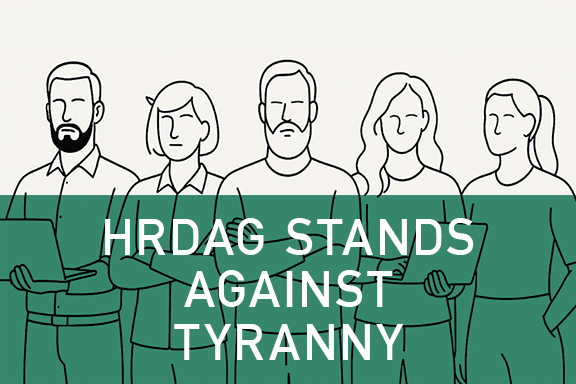IN THE FACE OF TYRANNY
Taking a Stand as Data Scientists
As human rights data analysts, we center our moral understanding on the values of the Universal Declaration of Human Rights. We believe that “recognition of the inherent dignity and of the equal and inalienable rights of all members of the human family is the foundation of freedom, justice and peace in the world,” as the Declaration’s preamble states. This is our guide, and these are our values. For thirty-five years, this has meant using our skills as statisticians and programmers to help other people in their campaigns for truth and justice.
When a doctor sees a sick or injured person, they run toward that person to render assistance. When a firefighter sees fire, they run toward the fire to assist with its control. When a human rights advocate sees a violation of freedom, justice, or peace, we must run toward that injustice. This is an obligation from Art. 28: “Everyone is entitled to a social and international order in which the rights and freedoms set forth in this Declaration can be fully realized.”
We run toward injustice to stand with the victims and to defend rights in general. Like a doctor who might become infected by their patient, or a firefighter who might be injured while controlling a blaze, we and our partners understand that perpetrators of human rights violations might turn their violence against us.
We choose to take this risk, and we do not do so casually. We consult, prepare, and evaluate situations. We weigh the principles at stake, the tactics to advance those principles, and the human rights objectives to be achieved.
Sometimes it is necessary to put ourselves in harm’s way. Over the last thirty-five years, we have understood our role as supporting defenders, while we stay mostly in the background. When our work has been in other countries, we have sometimes shared a tiny bit of the risk to which our partners are constantly exposed, but we always had the privilege of returning to safety in the US.
This moment is different. Over the last century, US government scientists have conducted some of the most rigorous scientific work in human history; their work has improved human life immeasurably. In recent months, at the Administration’s order, priceless datasets are being deleted, scientists fired, and agencies dismantled. Art. 27(1) states that “Everyone has the right … to share in scientific advancement and its benefits.” We interpret the Administration’s vandalism as a direct assault on the human right to knowledge, and this is an attack on who we are.
We are watching the US government make threats and attempts to control or destroy universities, on foundations and nonprofits, and the International Criminal Court. These institutions are how humankind exercises freedom, pursues justice, and seeks peace.
We have chosen to say this now because we know that “disregard and contempt for human rights have resulted in barbarous acts which have outraged the conscience of mankind,” and we know the history that led nations to proclaim the Declaration “as a common standard of achievement of all peoples and all nations.” Faced with hostile actions against human rights and to our own work, we restate that human rights are the center of our professional identities and our personal values.
We will seek actions that reaffirm our rights to speech, to association, to science, and to solidarity with those defending these rights. We will redouble our efforts to use statistics and technology to document violations of human rights and to hold accountable those who violate these rights. We choose to run toward injustice; this is our calling and our commitment.
This is our world, and we will not be silent.

